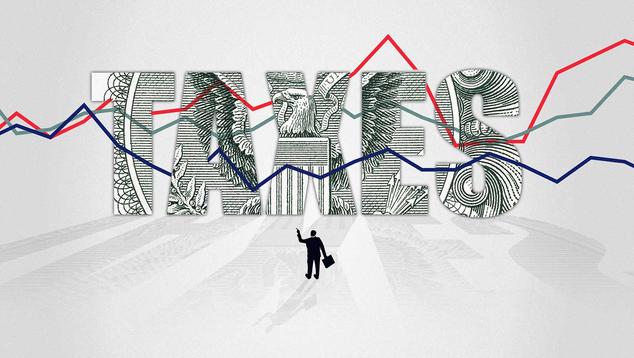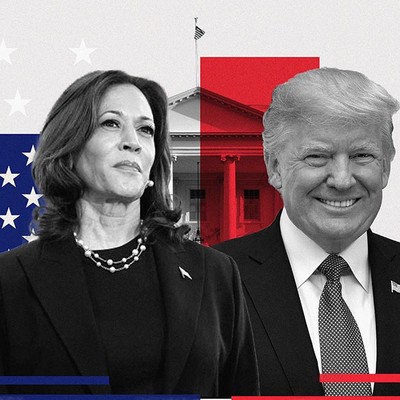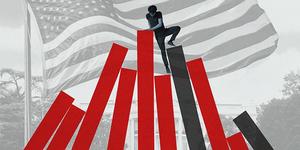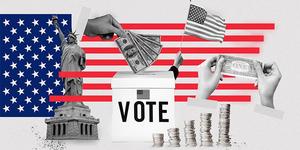Both major-party presidential candidates have focused on changes in the tax code as a significant part of their campaigns this year. This is not surprising. Modifying tax rates and tax exemptions is an easy way to push and pull economic levers because the system that collects money from our paychecks is already in place. Elected officials just have to tweak the system rather than create new programs -- say, a national sales tax -- from scratch.
The prominence of taxes on the campaign trail raises the question of how Americans themselves view their taxes -- and, by inference, how the public would react to the candidates’ proposals if they were made law. To answer this question, we will take a look at recent and historical Gallup data measuring public opinion on taxes, a review that leads us to a series of interesting conclusions.
1. Despite the attention given to taxes by politicians and presidential candidates, we don’t find strong evidence that Americans view taxes as one of the major problems facing the country or as extremely important to their presidential vote.
Just 4% of Americans mentioned taxes specifically when asked in Gallup’s April Economy and Personal Finance survey to name the most important financial problem facing their family. Similarly, few Americans mention taxes as the most important problem facing the nation.
Additionally, taxes don’t appear to be a particularly high priority when Americans are asked about the importance of the presidential candidates' positions on 22 specific issues. Thirty-six percent say taxes are “extremely important" to their vote, putting taxes roughly in the middle of the list. By way of comparison, the most important issue is the economy, which 52% rate as extremely important. The importance given to taxes is moderately higher this year than in 2020 and 2016, although slightly lower than measured in two other election years, 2008 and 2000.
A Pew Research poll from earlier this year found that well below half (38%) of Americans say the amount they pay in federal taxes bothers them a lot. This is well below several other issues that bother Americans more -- including the idea that corporations and wealthy people don’t pay their fair share of taxes (an issue to which I will return below) and the complexity of the tax system.
2. Republicans attach more importance to taxes than do Democrats.
The partisan divide on perceptions of taxes will be a dominant motif in this review. Taxes are clearly a more salient issue to Republicans than to Democrats. Taxes rank fifth out of 22 issues in importance to Republicans’ presidential vote, behind the economy, immigration, terrorism and national security, and crime. For Democrats, taxes are essentially tied with a number of other issues as least important.
At the same time, only 6% of Republicans and 5% of independents mention taxes as their most important personal financial problem, way below other financial issues. This compares with 1% of Democrats who mention taxes.
3. Americans’ perceptions that their federal taxes are too high have generally been lower in recent decades than they were before 2003.
Gallup routinely askes Americans to rate whether their federal taxes are too high, about right or too low. We can divide results into two broad periods. The average perception that taxes are too high was 59% in the years from 1956 to April 2001. The average from 2003 through 2024 has been significantly lower, at 50%. In short, Americans have not been as negative about their taxes since 2003 as they were at many points before 2001. This shift, at least initially, most likely reflected the legacy of the tax cuts enacted in 2001 and 2003 under President George W. Bush.
At the same time, within this broad context, we have seen significant fluctuations in Americans’ views of their taxes in recent years. These shifts include a “taxes too high” uptick in the last years of the Barack Obama administration, a significant drop during the Donald Trump years, and then an uptick again over the past three years.
Our most recent measure, in April of this year, showed that 56% of Americans say their federal taxes are “too high.” (The rest mostly say their taxes are “about right.” Not surprisingly, few say their taxes are “too low.”) The 56% “too high” reading is down modestly from last year’s 60% reading, the highest since 2001.
4. Republicans’ views of their taxes have fluctuated significantly in recent years, while Democrats’ views have remained remarkably stable.
The three party groups held similar views about their taxes from about 2003 through 2007, after which Democrats became less worried, separating from the pack. Democrats have since maintained relatively stable and low concern about their taxes being too high, hovering around 40%.
The attitudes of Republicans and, to a lesser degree, independents have been much more variable, generally shifting with changes in the party of the president in office at the time.
Since 2010, Republicans’ views of their taxes being too high have swung from as high as 72% in 2016 (at the end of Obama’s presidency) to as low as 45% in 2018 (in the middle of Trump’s term) -- a 27-percentage-point range. Over the same period, independents’ belief that their taxes are too high has varied by 15 points, between a low of 45% in 2019 and a high of 62% in 2023. This compares with a 10-point variation among Democrats. As a result, Republicans (and independents) have been the major drivers of change in the overall too high/too low trend.
Republicans’ more-positive views about their taxes during the Trump years likely at least partly reflect the reality of lower taxes that accrued from the Tax Cuts and Jobs Act of 2017. That law has remained in effect up to the current time. Yet Republicans’ views of the taxes they pay became significantly more negative as Joe Biden took office, particularly over the past three years. (The Biden administration’s Inflation Reduction Act of 2022 did raise some taxes on businesses and corporations -- although not individual tax rates on most Americans.)
In short, Republicans are apparently quite sensitive to shifts in the political environment when they rate their taxes. Republicans -- who were negative on their own taxes during Trump’s 2016 campaign, more positive than negative after the passage of the 2017 tax cuts in his administration, and negative again in the Biden years -- may be particularly responsive to Trump’s position on taxes.
5. Partisan differences in views of taxes are at least as powerful as income in predicting views of personal tax burdens.
As a rule, Americans are subject to a higher income tax rate when they make more money. But Democrats’ views of their own federal tax burden are remarkably stable regardless of their income, varying by only two points across income groups.
The views of Republicans and independents, on the other hand, vary significantly by income. Views of taxes being too high are particularly prevalent among Republicans and independents making $100,000 or more.
In short, Republicans’ views of their personal taxes are variable and sensitive to circumstances. These include not only the political environment (as we have seen) but also their personal income. To a lesser degree, independents follow this same pattern. Democrats’ views of their taxes appear much more insulated from these external factors, reflecting their ideologically more tolerant view of taxes.
6. Gallup also asks Americans to rate the fairness of their federal taxes. The fairness trend mirrors changes over time in the views of taxes being too high or too low.
One reason we continue to ask the “taxes fair” question is its historical value. Gallup first asked the question in 1943, during World War II. At that point, no doubt reflecting Americans’ patriotic view that tax monies were needed to support the war effort, substantial percentages of Americans said their taxes were fair.
These fairness perceptions have declined in the decades since Gallup next asked the question, in 1997. But in most years, Americans have continued to be more likely to say their taxes are fair than unfair. The unfairness percentage edged up to 51% in 2023, but this year, the public is essentially split down the middle -- with 49% saying their federal taxes are fair, and 47% saying they are not.
The ups and downs in Americans’ views of their taxes as unfair have consistently paralleled their view of their taxes being too high. As one goes up, so does the other, and the same is true when one goes down. But across time, Americans consistently are not as likely to view their taxes as unfair as they are to view them as too high.
This year, interestingly, 11% of Americans hold seemingly contradictory views -- my taxes are too high, but the amount of taxes I pay is fair. Most of the rest hold consistent views -- my taxes are too high and unfair (43%), or my taxes are about right and fair (33%).
Democrats’ (and, in most years, independents’) majority views that their taxes are fair have been relatively stable in recent years.
Republicans’ views of the fairness of their taxes have shifted significantly, similar to the trend in their views that their taxes are too high. The majority of Republicans viewed their taxes as fair during the Trump years. But about half or less viewed their taxes as fair during the Obama years and the Biden years.
7. Americans are generally OK with increased taxes on $400,000+ households.
Democratic presidential nominee Kamala Harris’ economic proposals include an increase in the top marginal tax rate for high earners -- and a promise not to raise taxes on those making below $400,000. The vast majority of American households -- about 97% -- make less than $400,000 a year. So, we might assume that raising taxes on the $400,000+ group would meet majority approval.
That seems to be the case, based on data from our April Personal Finance poll showing that 55% of Americans believe upper-income people pay too little in taxes. Presumably, Americans would support a proposal to make high-income people pay more. (Interestingly, 12% of Americans -- mostly independents and Republicans -- say upper-income people pay too much.)
The 55% “too little” figure for the taxes paid by upper-income people is tied for the lowest in Gallup’s history of asking the question. So, for the moment, it appears that a slimmer majority of Americans than usual would in theory support raising taxes on higher-income Americans.
By this point, it should come as no surprise to find that this issue is highly partisan. Over eight in 10 Democrats say upper-income people pay too little. But just half of independents and 38% of Republicans agree.
Other Gallup data have shown similar results when Americans are asked more directly about raising taxes on those with high incomes.
One question Gallup has included in its surveys going back to the 1930s asks if the government should or should not redistribute wealth by levying “heavy taxes on the rich.” In the most recent four times the question has been asked since 2013, slim majorities approved of the idea of heavy taxes on the rich. The latest results, from 2022, are 52% who say the government should do this, while 47% say it should not.
Polls conducted by other organizations asking about raising taxes on high-income earners in less extreme terms show somewhat higher support.
8. Americans broadly favor higher taxes on corporations.
Proposals for how to handle taxes on corporations are a clear distinguishing factor between candidates Trump and Harris. Trump would lower corporate taxes further, while Harris would raise them.
In this respect, Harris’ plan would appear to be more in sync with prevailing public opinion. Seven in 10 Americans agree that corporations in the U.S. are paying too little in taxes. That sentiment has remained relatively constant in recent years.
Unlike what we have seen on other tax-related policy proposals, a majority of all three partisan groups agree that corporations pay too little in federal taxes. The spread across partisan groups this year ranges from 93% among Democrats to 54% among Republicans, with independents at 65%.
Bottom Line
A review of Americans’ views of taxes reveals a complicated reality. A modest majority say their federal taxes are too high, but that leaves a significant minority who do not share this view. Further, perceptions of personal taxes reflect more than one’s tax burden per se. Republicans’ and, to a lesser extent, independents’ views about their own taxes appear to be influenced by the political environment, perceiving a higher burden with a Democrat and a lower burden with a Republican in the White House. Democrats are more positive in their views of their federal taxes and fairly steady in this belief, even as administrations change.
These data suggest that Republicans’ views of their taxes will become more positive if Trump regains the White House next year, regardless of any actual changes in the tax code. If Harris wins, Republicans’ views will remain negative. In reality, most Americans appear unlikely to see their federal taxes increased because Trump vows to keep the current tax law in place, while Harris says she will not raise taxes on the vast majority of Americans who make less than $400,000 a year.
Harris’ plan to increase taxes on upper-income households will meet with majority approval even though Republicans will disapprove. There is, however, majority approval across all partisan groups for the idea of increasing taxes on corporations.
Finally, there is the possibility of further tax decreases after the election. Trump has called for a series of tax cuts relating to specific types of income, including tip income (Harris has agreed with this proposal), overtime pay, Social Security income, and most recently on money earned abroad and interest paid on car loans. We don’t have a lot of data on the public reaction to these targeted tax cuts at this point. Trump’s continuing rollout of these types of tax exemptions underscores his conviction that voters dislike taxes and will react positively to any effort to cut them back. This review has indicated that Republicans and, to a degree, independents would most likely react positively to any cuts in their taxes, but that Democrats’ reactions would be less enthusiastic.
To stay up to date with the latest Gallup News insights and updates, follow us on X @Gallup.





